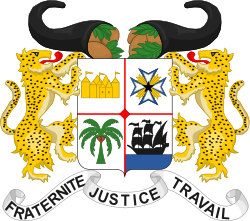This article relies largely or entirely on a single source .(August 2025) |
 |
|---|
Union for the Nation (French : Union pour la Nation) [1] is a political party in Benin. The general secretary of the party (as of 2000) is Alexandre Hountondji.
This article relies largely or entirely on a single source .(August 2025) |
 |
|---|
Union for the Nation (French : Union pour la Nation) [1] is a political party in Benin. The general secretary of the party (as of 2000) is Alexandre Hountondji.